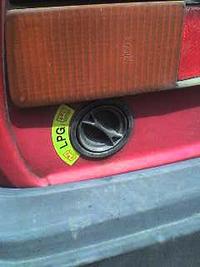More (ONLY????) Than 1.4 Million Autogas (LPG) Vehicles Will be Sold Annually Worldwide by 2020, Forecasts Pike Research
SEE ALSO: Big Oil Benefits From Divide and Conquer
BOULDER, Colo February 20, 2013; With a cost per gallon significantly lower than gasoline or diesel in many countries, and at least an initial existing infrastructure, the vehicle market for liquefied petroleum gas (LPG), otherwise known as propane or autogas, seems poised for growth. However, increasing interest in compressed natural gas as a vehicle fuel, along with hesitation by both biofuel producers and auto manufacturers to make a significant investment in autogas, will most likely limit future growth in this sector to a slow and steady pace. According to a new report from Pike Research, a part of Navigant's Energy Practice, the number of autogas vehicles sold worldwide each year will surpass 1.4 million by 2020.
"Autogas is relatively clean burning, easy to store and transport, has high energy content, and is widely available in many countries," says senior research analyst David Alexander. "In countries with government incentives, a commitment to limiting fuel taxes, infrastructure to make the fuel easy to obtain, and the availability of vehicles, this market will accelerate. That's unlikely to happen, though, in countries where autogas is not already established."
Turkey, where more than 200,000 autogas vehicles are sold each year, is by far the largest market in the world for these vehicles, according to the report. Because most applications for LPG have the fuel delivered to on-site storage tanks, the most popular automotive use in many countries is for fleet operations, where vehicles return to a central depot every day.
The report,"Propane Autogas Vehicles", analyzes the opportunities and challenges in the market for autogas vehicle conversions. The report provides an examination of autogas use in vehicles and highlights the countries where such conversions are most popular. The study includes forecasts through 2020 for component sales and installation labor cost by world region, along with a detailed analysis of the benefits, drivers, and market barriers for autogas vehicles. Key market players are also profiled. An Executive Summary of the report is available for free download on the Pike Research website.
About Pike Research
Pike Research, which joined Navigant's global Energy Practice on July 1, 2012, provides in-depth analysis of global clean technology markets. The team's research methodology combines supply-side industry analysis, end-user primary research and demand assessment, and deep examination of technology trends to provide a comprehensive view of the Smart Energy, Smart Utilities, Smart Transportation, Smart Industry, and Smart Buildings sectors. Additional information about Pike Research can be found at www.navigant.com/pikeresearch.
About Navigant
Navigant is a specialized, global expert services firm dedicated to assisting clients in creating and protecting value in the face of critical business risks and opportunities. Through senior level engagement with clients, Navigant professionals combine technical expertise in Disputes and Investigations, Economics, Financial Advisory and Management Consulting, with business pragmatism in the highly regulated Construction, Energy, Financial Services and Healthcare industries to support clients in addressing their most critical business needs. More information about Navigant can be found at www.navigant.com.
* The information contained in this press release concerning the report, "Propane Autogas Vehicles," is a summary and reflects Pike Research's current expectations based on market data and trend analysis. Market predictions and expectations are inherently uncertain and actual results may differ materially from those contained in this press release or the report. Please refer to the full report for a complete understanding of the assumptions underlying the repor's conclusions and the methodologies used to create the report. Neither Pike Research nor Navigant undertakes any obligation to update any of the information contained in article or the report.



